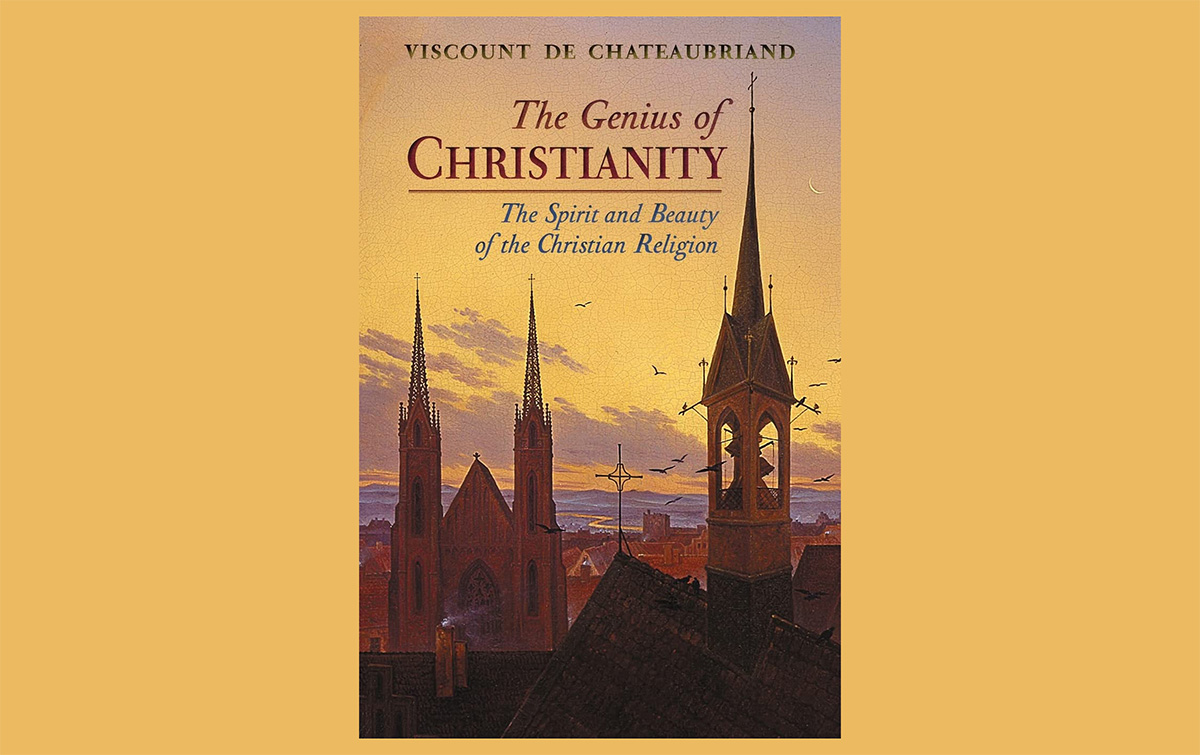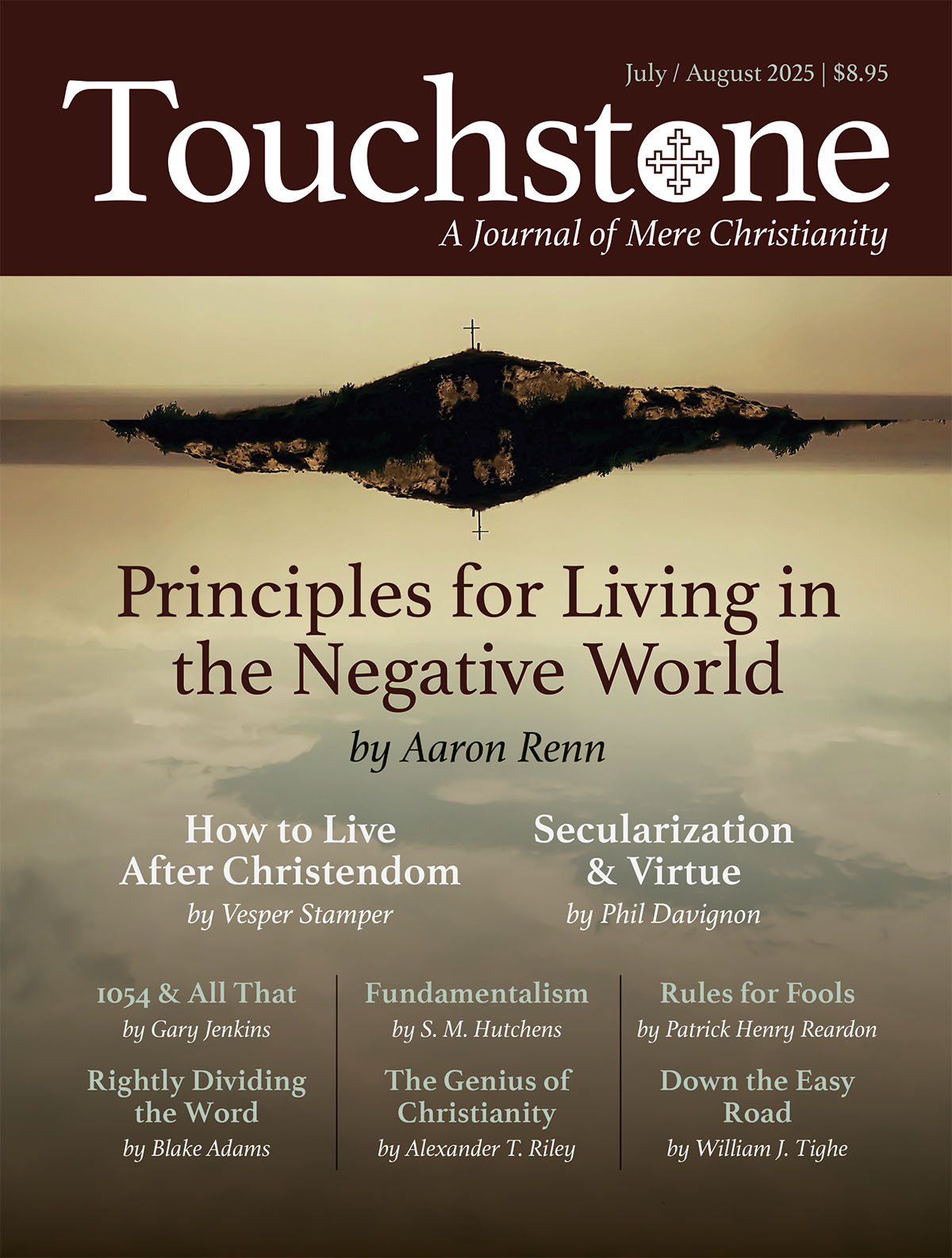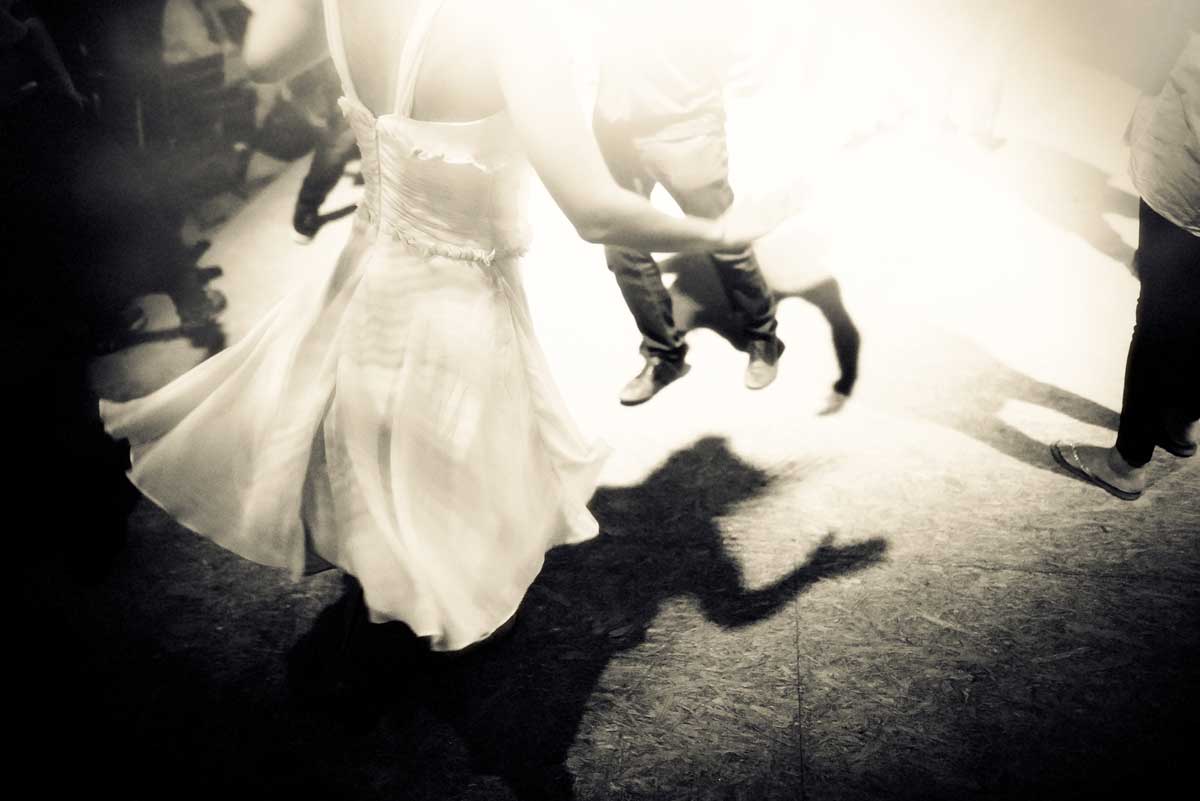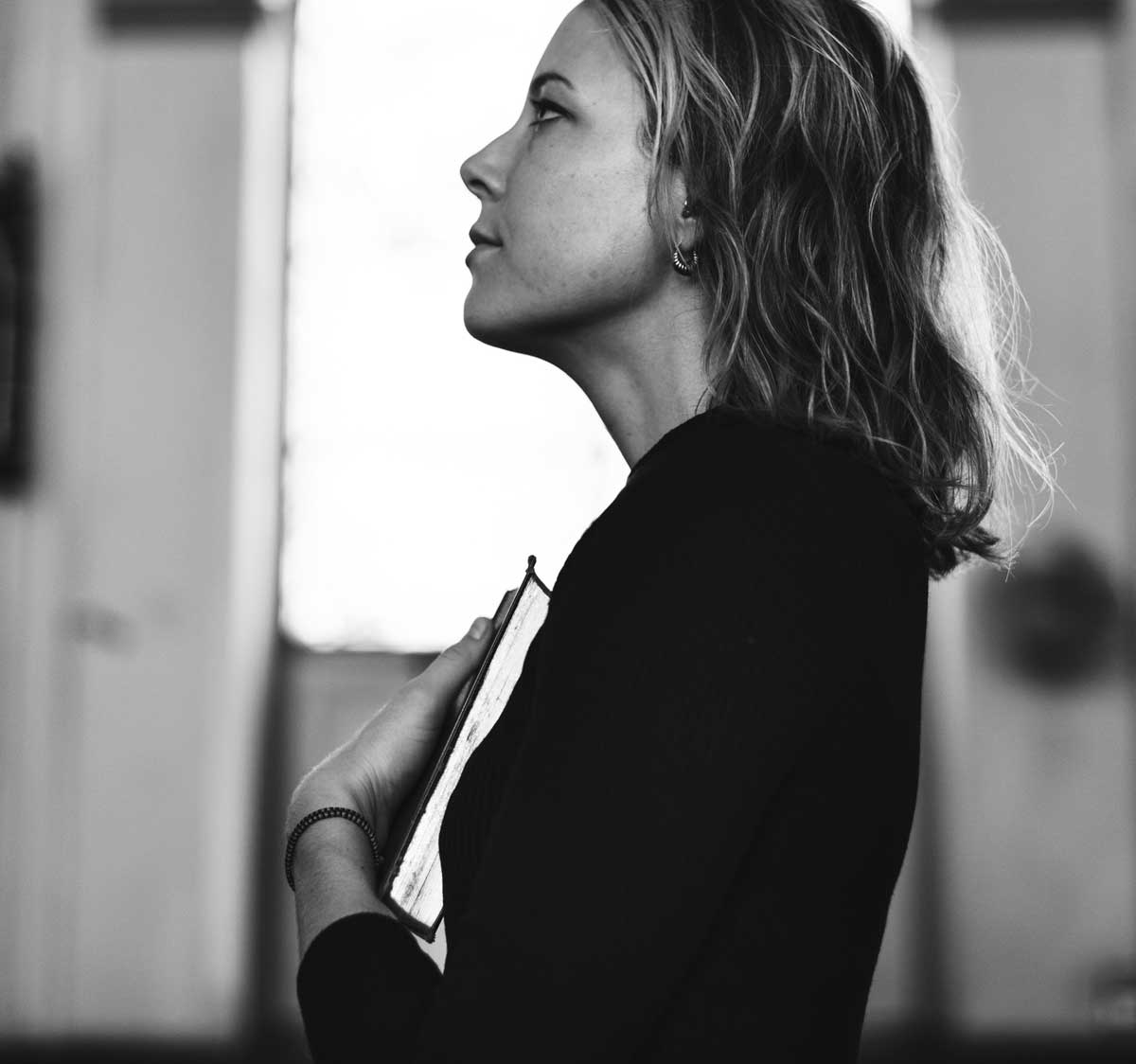A Guidepost in Our Current Misery
Chateaubriand’s The Genius of Christianity
Hopelessness is a looming threat in our contemporary world for those of a traditionalist bent. Everywhere, it would seem, we suffer losses, and our hold on our own culture weakens. It is not too much to say that a revolution is ongoing in American society, a revolution connected to cultural and social disruption elsewhere in the Western world but with uniquely American aspects. Basic aspects of social structure are being uprooted and dismantled, and deep cultural patterns of belief and behavior are now stigmatized and steadily attacked, all of this organized by factions of political and economic elites in thrall to a morally totalitarian ideology.
A healthy sense of the enormity of what we face is not to be disdained. It is hardly unrealistic to believe that the worst is possible. But how to stave off despair? The traditionalist often does well to look to historical precedents in taking on contemporary situations, however unique they might be or appear. Revolutions have, after all, happened before, and traditionalists have found ways to stand against them.
When François-René, vicomte de Chateaubriand, published The Genius of Christianity in the spring of 1802, he was newly returned to France, after a lengthy period of exile in a country that had been at war with his own country. The Treaty of Amiens had just brought an end to the chaos of the French Revolutionary Wars, though war would quickly return to Europe by the following year, once a certain Corsican general had risen to the status of emperor of France.
The young and still unknown Chateaubriand anticipated a rough reception for his book, to say the least:
What hope could I have, nameless and without any to praise me, to destroy the influence of Voltaire, who had been dominant for more than half a century . . . ? What? Diderot, d’Alembert, Duclos, Dupuis, Helvetius, Condorcet were minds without authority? What? The world ought to return to the golden Legend, renounce its acquired admiration for the masterpieces of science and reason? . . . Was it not as ridiculous as it was reckless for an obscure man to oppose a philosophical movement so irresistible that it had produced the Revolution?
Reckless and ridiculous. Perhaps. Though the years of the Terror had passed by then, the revolutionary impetus was far from blunted. The Old Regime, in all its elements—the monarchy, the established institutional order, and the cultural backbone of the Church and the faith that undergirded it—seemed forever vanquished, and the future was fraught with uncertainty and danger.
Chateaubriand had himself, for a time, doubted whether the former order could or should withstand the pressures applied by the revolutionaries. He was born into an aristocratic family that had, in his grandfather’s generation, fallen considerably in rank, but his father made a fortune at sea and subsequently purchased a castle at Combourg on the stormy Brittany coast. There, Chateaubriand was born in 1768. As he reached adulthood, he took up a military career, and the cataclysm of the French Revolution struck just as he was entering his twenties.
He was in this period a disciple of the epoch’s literary spirit of revolution, Jean-Jacques Rousseau, as were so many other bright and idealistic men in the Europe of this time, so he had some philosophical sympathies with this political revolt. But then its visceral and extreme realities began to be revealed. After the fall of the Bastille, a violent mob made its way to his family’s residence, bearing the heads of victims on pikes. Years later, Chateaubriand recounted this horrifying experience thus:
If I had had a rifle, I would have fired on these wretches as if at wolves. They screamed and hammered renewed blows on the courtyard door, to knock it down and add my head to those of their victims. . . . Those heads . . . changed my political disposition. I was horrified by these cannibal feasts, and the idea of leaving France for some faraway country was born in my mind.
Exile
Pushed by the force of these events, he left France in early 1791, bound for America and the adventure of a literary and philosophical project. His desire was to study and depict what he and many others in Europe believed to be the existence of humankind in the pure state of nature in the indigenous peoples of the New World. When he arrived, he spent months gathering observations and experiences that would inform the Romantic tales—Les Natchez, Atala, and René—that are today his primary legacy in his native France and elsewhere. By the end of 1791, though, he had resolved to return home, as the Revolution was turning in a still more radical direction and Chateaubriand now felt compelled to enter the struggle against its excesses.
After the return voyage across the Atlantic, he joined the Army of Condé, a force made up of Royalist aristocrats who had been forced from France by the Revolution but had now returned to fight against it. He was severely wounded at Thionville in 1792 and fled to Jersey and into exile. He would not see France again for seven long years.
While abroad, and while the Revolution raged on in France, he was tortured by thoughts of his family back home. He gives an emotional account of this in his multivolume masterpiece of a biography, Memoirs from Beyond the Grave. The sense not only that his country was doomed but also that members of his own family who stayed would suffer overwhelmed him: “What were our chagrins in a foreign land compared to those of the French who remained in their country? And moreover, what unhappiness, amid the sufferings of exile, to know that our leaving itself became the pretext for the persecution of our loved ones.”
The dangers were palpably real. The Revolution took the lives of his brother and sister-in-law on the scaffold, and it imprisoned his wife and both of his sisters. In the Memoirs there isa profoundly moving passage in which he describes being brought the wedding ring of his sister-in-law, which was found broken and discarded in the gutter of the rue Cassette, a stone’s throw from the Palais du Luxembourg, where she had been imprisoned. In anguish, he wonders where and under what circumstances she had lost it:
[H]ad she passed through the rue Cassette on the way to the scaffold? . . . Had the ring been torn from her finger after her execution? I was gripped by the sight of that symbol which, by its brokenness and its inscription, recalled to me such cruel destinies. Something mysterious and fatal was attached to that ring my sister-in-law seemed to have sent me from the land of the dead, in memory of her and of my brother.
The history and context of the composition of The Genius of Christianity is essential to its deepest meaning. In the summer of 1798, his sister Julie de Farcy had written to inform him of the “death of the best of mothers.” Julie would herself die within a year of writing that letter, having suffered immensely under lock and key during the revolutionary regime. In her letter, she also suggested that her brother had brought much pain to their beloved mother in her final days. While in England, Chateaubriand had written a first volume of a study of revolutions that assumed a historical relativist position on the bloody events that were transpiring in France. One of its final chapters, in its title, posed a question assured of provoking any faithful adherent to traditional France: “What will be the religion that will take the place of Christianity?” Many in his aristocratic class, including members of his own family, were outraged at his tone. His mother, a deeply devout Christian, was devastated by her son’s drift away from the faith.
His sister’s announcement of their mother’s demise, and her charge of the dire effect of his skepticism on her, agonized Chateaubriand. While the woman who brought him into the world was dying, he asked himself, what was he doing in London? Perhaps he had idled away the time on some pleasurable promenade at the very moment his mother was sweating in the agony of her final hours, her son unavailable to wipe her troubled brow. “The idea that I had poisoned the latter days of the woman who carried me in her womb,” he wrote, “made me despair.”
The deaths of mother and sister, the latter of whom had also turned to a vigorously ascetic Christian practice in her final days, emotionally overwhelmed him. He was struck, as he later wrote in the first preface to The Genius of Christianity, by “these two voices escaped from the tomb.” Suddenly, overpoweringly, the truth of the Cross returned to him:
“[M]y conviction came from the heart. I cried and I believed.”
The project of a fitting testimony to this return to the religion of his youth and of his deceased mother, who had ceaselessly prayed for his return to the flock but who passed from this world before she could witness the coming to fruit of those prayers, then came to him in a flash. He began work on what is the anguished testimony of a son brought back from the brink by the loss of his most dear one, weeping over her absence but now consoled by the certainty that he would see her again.
When he returned to France in 1800, he was carrying the nearly completed manuscript with him.
Defending the Faith
It is a remarkable testimony to the decline of the influence of the faith in France, and in the West more broadly, that Chateaubriand’s masterpiece has been as neglected as it has. It is a universal defense of the faith, an account of every angle of human life, of the natural world, and of all physical reality from the lens of Christian belief. The case is made in a poetic form unmatched in the rest of apologetic literature, as Chateaubriand was perhaps the greatest of the Romantic-era French writers, gifted with all the powers of that time in literature.
The Genius of Christianity can be understood as a beautifully crafted encyclopedia of the faith, covering every topic one could desire to be treated in the nature of Christian belief, practice, and history. It is a defense of Christianity not only on theological terrain, but also in the purview of virtually every other human pursuit—aesthetic and artistic, political, moral, civic, and social. It can be read systematically, or one can move through it at random, selecting from the myriad topics it takes up, from celibacy and marriage to the natural philosophy of Christianity and significant historical Christian writers and thinkers such as Pascal and Bossuet.
It would be impossible even to scratch the surface of this massive work’s depth in a short essay. One can do no more than pick a few telling examples.
Marriage is described here in all its Christian majesty, in a language that any contemporary reader, could he or she be made just for a minute to put aside the easy cynicism and sardonic unseriousness that pass as our contemporary culture, would find overwhelming in its pure descriptive elegance. Christian marriage is an institution of a gravity and solemnity unattained outside the faith. Entering it, we understand how fundamentally our lives must change. The husband is “fill[ed] with profound awe” by the nuptial blessing, which was given by God himself to the world’s first couple. The husband becomes Adam, and the weight of the patriarch—the responsibility to provide for a family—is placed inexorably upon his shoulders. The sobering duty of the wife, too, clears her head of frivolity, as God speaks to her from the altar: “Knowest thou, O Eve . . . what it is to bear in thy mortal womb an immortal being, formed in the image of God?”
How unsurprising that a culture that has trivialized marriage into something akin to the leasing of a car would fail to appreciate what a tremendous gift it is, precisely because it requires so much of us. To make no demands of someone is to speak to his inability to measure up to any standard.
Marriage is not the only extraordinary Christian rite of passage. The death of a Christian, surrounded as it is by exacting ritual and the intimate care of his fellows, is as remarkable as his way of life. The Church prepares the perishing believer for his entry into another life with a second baptism, this one not with water but with the oil of extreme unction, which symbolizes “celestial incorruptibility.” As the man of faith passes across the border from this world to the next, a peace descends upon him that is remarked upon by all who observe. Chateaubriand writes touchingly of the deceased’s friends “keep[ing] silent watch around his couch, under the impression that he only slumbers: so gently did this Christian pass from earth.”
The Romantic Chateaubriand gives us a soaring defense of the poetic and literary profundity of Christianity. He celebrates the Christian replacement of the overpopulated pagan world of mythology with a realm in which silence and solitude open space to give room to the prayerful Christian to make his pleas to his God, to allow his “uninterrupted contemplation” of the “immensity of nature” that echoes the infinite extension of the God who made it.
The capacity to express the “instinctive melancholy” in humankind is spoken to by this uniquely Christian view of nature. Whereas non-Christian literature consists of descriptions of the busy commerce of humans and mythological creatures of myriad varieties, Christian literature develops an unchallenged perspicacity in accounting for the mystery and wonder of the human soul before the marvel of the creation itself. “Who has not spent whole hours seated on the bank of a river contemplating its passing waves?” Chateaubriand asks; “Who has not found pleasure on the seashore in viewing the distant rock whitened by the billows?” We cannot but pity “the ancients . . . who discovered in the ocean naught but the palace of Neptune and the cavern of Proteus!”
Literary characters and personages also become more profound with the moral seriousness of the Christian narrative. Pagan heroes might be handsome of feature and physically imposing, but Christian ones show a “greatness of soul” that makes them more beautiful and courageous than any Ajax, Hector, or Achilles. Even the frailest of knights, full of the spiritual energy of redemption, faces the enemy without trembling and dies happily for his God.
A world without Christianity is contemplated by the author at the conclusion of the book. Among the moral catastrophes imaginable in such a world can be numbered one that our current multiculturalist opponents of everything Christian would do well to address more closely. Where would the abolitionist movement against slavery have come from if it had had no Christian philosophy of the human person to consult as its baseline? Slaves and masters in the pre-Christian world shared the same depraved “religion of the passions” that made moral improvement an impossibility. It was only with Christian universalism that the awful institution of slavery could be seen nakedly in its monstrosity.
Against Despair
If hopelessness had descended upon Chateaubriand during his time in exile, it would have been easily comprehensible. The direness of the situation of his country—and that of his own family—was patent. But he found another way, spurred as it happened by his own suffering, to return to a faith he had for a time believed unfit for the world in which he lived.
This faith endured in him for the rest of his life. In the last section of his Memoirs, he looked at the seeming inevitability of the arrival of socialism and saw that it would inexorably lead to despotism and tyranny. The only solution he could imagine was a return to Christian faith in France and throughout Europe. The final work he published in his lifetime was a biography of Armand Jean le Bouthillier de Rancé, who left an aristocratic life as a young man in the early 1660s to found the Trappist order of monks.
We might do well to return to reading Chateaubriand now, in what is a fearsome time in the life of our own republic. The revolutionaries are knocking at our doors, too. They do not (yet) literally bear heads on pikes, but the number of lives they have ruined through their corruption of our culture and venomous attacks on those who oppose their revolution grows daily. From seemingly every segment of elite American society, they tyrannically and rabidly announce to us the shattering of the system of values our ancestors built and maintained, values that brought prosperity and health to this society for so long.
In March of 1817, speaking before the French Chambre des Pairs, which was the upper house in France’s parliament between 1814 and 1848, Chateaubriand made a statement about the role of Christianity in the life of society, and the consequences of its suppression, that is timeless in its applicability and superb in its expression. It reminds us that our own struggle is of a piece with that of his time, and the desired destination of the vandals and the way to victory against them is the same in both cases.
One may attack religion in its cult, in its goods, in its ministers, but one cannot make it so that a society can subsist without religion. An ignorant monk, full of faith, can found an empire; an unbelieving Newton can measure the world but not create a people. Paris, instructed by the modern doctors, produced a republic that lasted ten years; a monarchy of fourteen centuries emerged from the town of Lutetia where Saint Denis preached the Gospel. If we seriously want to save our country, let us return to sane doctrines. . . . Let us defend ourselves from those who would desire religion without freedom; but we must fear still more those who want freedom without religion. We must not introduce what is false into morality . . . we will arrive at the frightful result that there is no longer anything illegitimate in France but legitimacy. . . . When atheism was professed in France [during the Revolution], who would have ever thought these impious extravagances would prevail? We see the consequences of these insane doctrines. The professors made students, and the great nation, robbed of its religion and its morality, was at the same time robbed of the arms that could protect it against anarchy. It was reserved for our modern thinkers to uproot from the heart of man all respect for the Divinity, in order to prepare their contemporaries to become merciless assassins.
Alexander T. Riley is a senior fellow at the Alexander Hamilton Institute for the Study of Western Civilization and a member of the board of directors of the National Association of Scholars.
subscription options
Order
Print/Online Subscription

Get six issues (one year) of Touchstone PLUS full online access including pdf downloads for only $39.95. That's only $3.34 per month!
Order
Online Only
Subscription

Get a one-year full-access subscription to the Touchstone online archives for only $19.95. That's only $1.66 per month!
bulk subscriptions
Order Touchstone subscriptions in bulk and save $10 per sub! Each subscription includes 6 issues of Touchstone plus full online access to touchstonemag.com—including archives, videos, and pdf downloads of recent issues for only $29.95 each! Great for churches or study groups.
Transactions will be processed on a secure server.
more on Christianity from the online archives
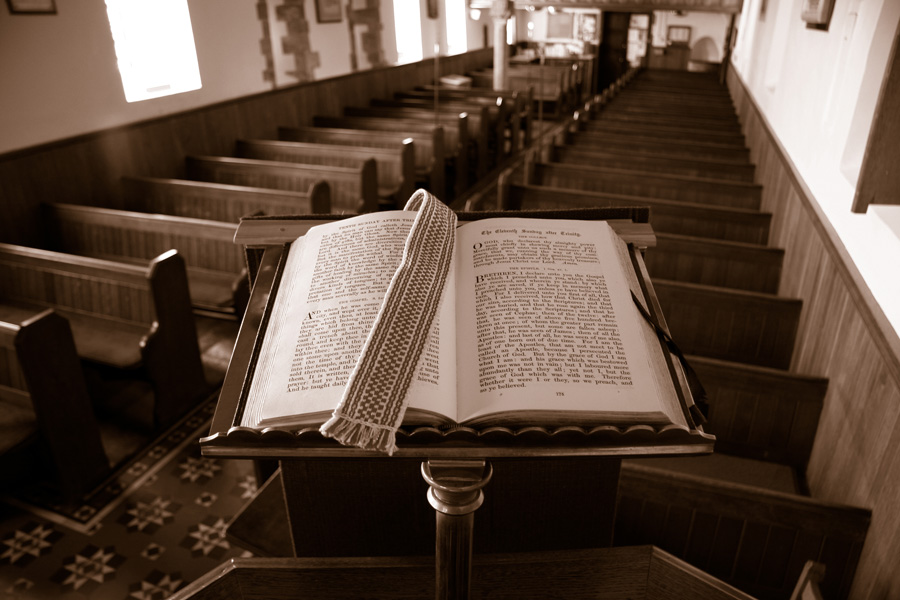
8.4—Fall 1995
The Demise of Biblical Preaching
Distortions of the Gospel and its Recovery by Donald G. Bloesch
more from the online archives
calling all readers
Please Donate
"There are magazines worth reading but few worth saving . . . Touchstone is just such a magazine."
—Alice von Hildebrand
"Here we do not concede one square millimeter of territory to falsehood, folly, contemporary sentimentality, or fashion. We speak the truth, and let God be our judge. . . . Touchstone is the one committedly Christian conservative journal."
—Anthony Esolen, Touchstone senior editor





